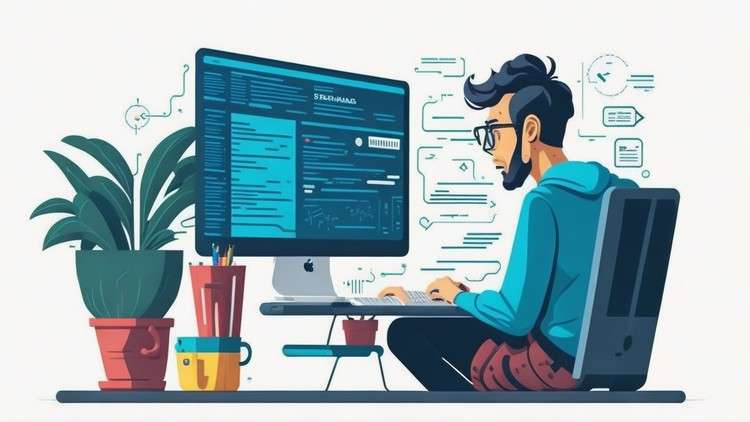
Mastering Java SE 11: Your Comprehensive Guide to Acing the 1Z0-819 Developer Exam
What you will learn
Understand Java Basics: Master the fundamentals of Java, including data types, variables, and operators.
Grasp Java Control Flow: Demonstrate proficiency in using loops, conditionals, and exception handling.
Java Object-Oriented Concepts: Understand and apply principles of encapsulation, inheritance, and polymorphism.
Java API Mastery: Utilize core Java libraries and classes effectively.
Concurrency: Demonstrate the ability to create and manage concurrent Java applications using threads.
Java I/O: Understand and apply Java techniques for reading and writing data.
Java Modules: Grasp the modular system introduced in Java 9 and its importance.
Annotations: Understand and apply Java annotations in code.
JDBC: Demonstrate the ability to connect and interact with databases using Java.
Security: Understand Java’s security features and best practices for secure coding.
Description
INFO ABOUT THE EXAM
- Format: Multiple Choice
- Duration: 90 Minutes
- Number of Questions: 50
- Passing Score: 68%
- Validation:Exam has been validated for product version Java 11
Candidates who hold this certification have demonstrated proficiency in Java (Standard Edition) software development recognized by a wide range of world-wide industries. They have also exhibited thorough and broad knowledge of the Java programming language, coding practices and utilization of new features incorporated into Java SE 11. By passing the required exam, a certified individual proves tremendous fluency in Java SE and acquisition of the valuable professional skills required to be a Java software developer. This includes a deep understanding of object-orientation, functional programming through lambda expressions and streams, and modularity.
COURSE DESCRIPTION
The Java SE 11 Developer – 1Z0-819 examination is designed to validate the skills and knowledge of candidates in Java Standard Edition 11, which is one of the versions of the Java programming language and platform. The exam focuses on various aspects of the Java language, its libraries, and its runtime environment. Here’s a comprehensive description based on the topics that are typically covered in the exam:
- Understanding Java Technology and Environment: This section ensures that candidates are familiar with the Java platform, its architecture, and its advantages.
- Working with Java Data Types: Candidates should be proficient in using primitive data types, strings, and wrappers. They should also understand autoboxing, unboxing, and the implications of using them.
- Controlling Program Flow: This involves understanding and using conditional statements, loops, and branching. Candidates should be able to write code that can make decisions and repeat actions.
- Java Object-Oriented Approach: The exam tests the understanding of object-oriented principles in Java, including encapsulation, inheritance, and polymorphism. Candidates should be able to design and use classes and interfaces effectively.
- Exception Handling: Candidates should be adept at handling exceptions using try-catch blocks, throwing exceptions, and creating custom exception classes.
- Working with Arrays and Collections: This section covers the use of arrays, arraylists, and other collection classes. It also touches upon generics and the implications of using them.
- Working with Streams and Lambda expressions: Candidates should be familiar with the Stream API, lambda expressions, and method references. They should be able to process data using streams and write functional-style code using lambdas.
- Java Platform Module System: This section delves into the module system introduced in Java 9. Candidates should understand how to create modules, use services in modules, and understand the module path.
- Concurrency: Candidates should understand the basics of multi-threading, synchronization, and the classes in the java.util.concurrent package.
- Java I/O API: This involves reading and writing data using the Java I/O classes, understanding file attributes, and working with the NIO.2 API.
- Secure Coding in Java SE Application: Candidates should be familiar with the security aspects of Java, including using the Java security manager, working with security policies, and understanding common security threats.
- Database Applications with JDBC: This section covers connecting to databases using the JDBC API, executing SQL queries from Java, and understanding the basics of transactions.
- Annotations: Candidates should understand the purpose of annotations, how to define them, and how to use built-in annotations in Java.
- Localization: This involves understanding how to write programs that can adapt to different locales, using resource bundles and the java.text package.
The exam typically consists of multiple-choice questions, and candidates might be required to analyze code snippets, identify correct or incorrect statements, or complete code to achieve a specific result. It’s essential for candidates to have hands-on experience with Java SE 11 and to have worked on real-world projects to successfully pass the exam.
FAQ
Can I take the practice test more than once?
You can take each practical test multiple times.
What result is required?
The required grade for each practice test is 60% correct answers.
What is the time limit for one exam?
The time for each exam is 90 minutes.
Can I see my answers?
You can review all the answers for completing a given test.
Are there explanations for the answers?
There is a view of full explanations for each of the answers, both correct and incorrect.